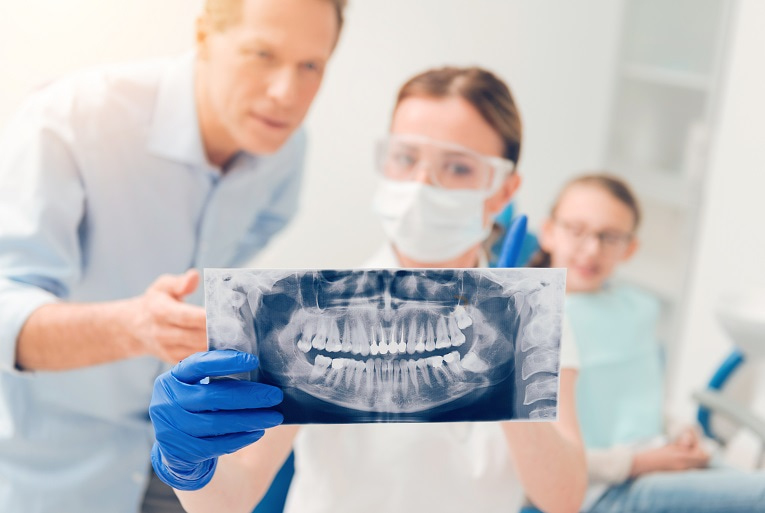There’s no denying that wisdom teeth are a normal part of your child’s growth and development. However, at times, they can become a serious problem and cause all sorts of issues that could affect the mouth and even the rest of the face. That’s why you should learn more about them, including how to take care of them.
At first, wisdom teeth grow behind other baby teeth, but at about the age of 12 or 15, they start pushing up through the gums, which can make you uncomfortable. It’s said that most people have two pairs of wisdom teeth: one pair at the top and another pair on the bottom. However, this may vary according to your genetic code.
These teeth are vital for chewing tough food items, but due to their late arrival, you’re likely to find them causing all sorts of dental issues over time. For this reason, you should be well aware of what could happen when your child’s wisdom teeth start coming in. Also, you have to be prepared should they end up requiring wisdom teeth extraction Blackfoot.

Here are some of the things you need to know about wisdom teeth:
1. When They Grow In Too Early
When a person’s wisdom teeth grow in much earlier than expected, this can cause severe damage to the upper and lower back molars. It’s because as the adult-sized wisdom teeth come in, they may cause all of your child’s baby teeth to become misaligned. There are also chances that the baby teeth might get damaged even if the adult-sized wisdom teeth have not yet fully come in.
Misaligned teeth are prevalent when a person has wisdom teeth growing in too early or out of order. In most cases, the primary molars will be pushed forward by the wisdom teeth, and this might create a gap between all of your child’s teeth.
2. Trouble With Chewing
Another thing you need to be aware of is that your child might have some serious trouble chewing anything when their wisdom teeth start pushing against the primary molars. You might even notice the back teeth getting shifted around, mainly due to the misalignment that your child might be experiencing.
Because of this shifting and misalignment, they’ll most likely experience pain in the mouth when eating anything that requires biting down with their back teeth. It’ll also be challenging for them to cut anything because the back teeth can no longer slice food properly.
3. Crowded Teeth
Crowded teeth are another problem people might have to deal with when their wisdom teeth start pushing against other teeth. It’s mainly because there isn’t enough room in the mouth for all the teeth.
For some people, their back molars will get pushed forward so much that their wisdom teeth wouldn’t have enough space to come in at all. There might be a bit of pain in other cases due to your child’s wisdom teeth pushing against the gums and causing them some discomfort.
4. Painful Gums
Your child might also experience severe pain and discomfort because of swelling gums. Since there simply isn’t enough room in the mouth, this’ll cause their gums to get pushed inward, which would trigger an excruciating sensation.
If the wisdom teeth are coming in correctly and in their proper order, then your child’s gums won’t be such a problem. However, if their wisdom teeth don’t come in at all because of how crowded all the other teeth are, you should be aware that their gums might also get pushed around and cause pain.
5. Wisdom Teeth Problems
Your child might experience many different problems with their wisdom teeth because they’re coming in the wrong way, they’ve shifted slightly, or there’s inadequate room for them.
Even if your child’s lucky enough to develop all of their wisdom teeth, they may still experience problems. You need to be aware of the most common issues associated with these teeth so you can act quickly and appropriately when something goes wrong.
The following are some of the most common problems related to wisdom teeth:
- Cysts/Tumors/Abscesses
Tooth abscess, tumors, and cysts can develop for a variety of reasons, but an infection typically causes them. When the tooth is covered by gum tissue at the extraction site, your dentist will likely prescribe antibiotics to treat any infection. However, cysts are more common with teeth that have fully emerged from the gums. If your child experiences severe pain, swelling, redness, hotness, or any other concerning symptoms in the area of their wisdom tooth extraction, contact your dentist right away.
- Dental Damage
Wisdom teeth can occasionally damage your child’s other teeth while they’re emerging through the gums. If this isn’t treated, it may lead to major issues later on in life since there’s only so much space for teeth to occupy. It’s important to have wisdom tooth pain examined by a dentist to correct any damage.
It’s also possible for wisdom teeth to damage other structures in your child’s mouth or produce damage through an impact with the adjacent tooth. In most cases, this should heal normally, but if it becomes inflamed or painful, contact a dentist immediately so they can assess whether there’s a bigger issue at play that needs treatment.
- Other Dental Issues
Crowding issues, decay, and crooked teeth are all possible due to the presence of wisdom teeth. Fortunately, these problems tend to be less severe or plagued by other issues that make them more challenging to deal with. However, they should still be monitored if they get worse over time.
If your child is having trouble chewing food or needs to use equipment like braces, retainers, or other oral devices to treat teeth shifting or damage caused by wisdom teeth, it might be best to ask professional help from a dentist.
6. Resolving The Problem
If you do notice that all of the things mentioned above are happening to your child, you should take them to see an experienced dentist who can take a look at what’s going on in their mouth.
You’ll need to have X-rays of their teeth taken so that the dentist can get a better idea of what’s causing all the pain and discomfort in your child’s mouth. At the same time, the dentist will use their knowledge, experience, and training to offer your child some type of solution that works for them.
If you want more information about wisdom teeth before seeing a dentist, you can visit websites that offer more details on this matter. You may contact your family doctor or pediatrician to get some extra support and information on what they recommend for someone who has wisdom teeth coming in too early should that be the case for your child.
You have to be aware of the fact that the dentist might need to extract your child’s wisdom teeth if they’re coming in too early, out of order, or causing too much pain and discomfort. That’s the reason it’s critical to have a seasoned dental professional assess the problem as soon as possible before any damage gets done.
7. Deciding On Treatment
Your child’s dentist will go over all of the different treatment plans with you so that you can choose which option would be most suitable for your child. They’ll also discuss the possible risks and complications of each treatment so that you may be able to make an informed decision.
Some possible treatment plans might include having the affected teeth removed, applying medication to stop any infection or discomfort in the mouth, or just keeping an eye on the wisdom teeth and waiting for them to appear at a later date. If your child’s problem is severe enough, they might even need surgery done to ensure that existing issues will be resolved.
In deciding on a treatment plan, you need to make sure that the one you go for is the best option for your child. You should also be confident that they can handle whatever type of treatment will be used on them since the whole situation might be very stressful for them.
The good news is that dentists usually have a lot of experience dealing with wisdom teeth problems, so they’ll know the most appropriate thing to do depending on the circumstances. In many instances, the only treatment that has to be carried out is a simple extraction if there’s pain or infection. In other cases, surgically removing the teeth would be the best route to take in order to avoid risks of damage to your child’s overall teeth structure or future dental health.
8. Letting The Dentists Do Their Job
Once you’ve chosen the type of wisdom teeth treatment that your dentist will perform on your child, you only need to sit back and let them do their job. The last thing you want to do is try to treat the problem on your own or allow just anybody to provide random treatments—they could cause more problems than they fix.
Make it a priority that your child gets the proper wisdom teeth treatment, and follow the dentist’s advice to a T. They’ll provide your child with pain relief and antibiotics if necessary and help them through this tough time in their life as well.
Remember that when you’re looking for the best dentist to solve your child’s problem with wisdom teeth, it’s essential to turn to someone who has experience dealing with the issue. The more knowledge they have about the condition, the better the decisions they’ll make in the process of figuring out how to treat your child.
9. Taking Care Of Your Child’s Teeth
If your child has had their wisdom teeth removed, then you should see to it that they’re taking care of their teeth properly. As a general rule, you can use the same types of oral hygiene tools to keep your child’s teeth clean and plaque-free. Also, it’d be an excellent habit for your child to use an antibacterial mouthwash every day so that they can kill off any lingering germs from their wisdom teeth. You should encourage them to visit the dentist regularly to check for signs of new problems or infections, especially after the removal of their wisdom teeth.
It’s essential to make sure that your child takes care of their oral health in the best way possible. This means doing everything they can to prevent any new infections from forming and letting their body heal properly when they contract an infection or experience other problems in the mouth. By looking after your child’s teeth well, you can make sure that they maintain excellent oral hygiene every day.
By following some good methods to keep your child’s teeth clean and looking great, you can rest assured they won’t experience any problems with their gums or health conditions like cavities while making them feel more confident. You should take note that if you’re serious about helping your child keep their oral health in check, you may have to modify their habits. This may involve cutting down the amount of sugary foods and drinks you give them, ensuring that they drink enough water every day, and getting them to develop the habit of brushing their teeth at least twice per day.
Final Thoughts: A Healthy Smile Is A Beautiful Smile
Wisdom teeth problems aren’t anything to worry about if your child’s dentist is there to help. Ensuring that your child promptly receives the exact treatment they need is a must so that they can avoid further complications or painful symptoms. Treating wisdom tooth pain early on will allow you to help your child steer clear of more severe issues that might affect them in the future.
In the end, you should know that your child will appreciate it when you take the necessary measures for them to have a healthy and bright smile. They might’ve been nervous about going to the dentist in the past because they’re afraid of pain, but this is no longer an issue due to modern dental treatments and tools. By keeping the information above in mind, you can teach your child how to take care of their teeth so they’ll have excellent oral health and a beautiful smile for the rest of their life.

